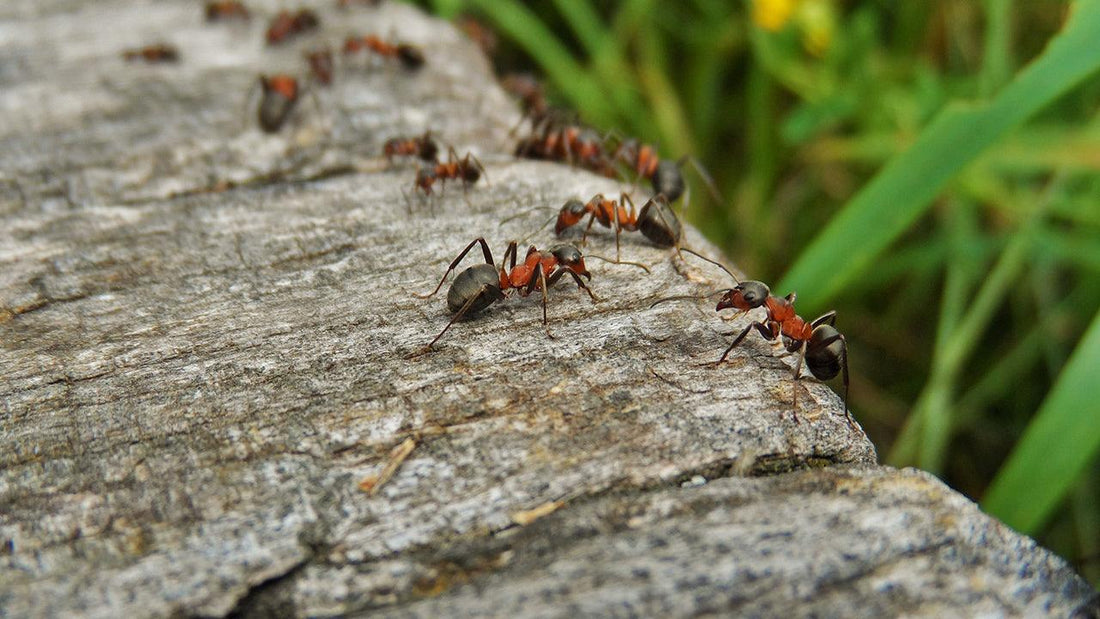Ants are fascinating creatures with impressive social structures, but when they invade your home, they can quickly become unwelcome guests. Fortunately, there are effective ways to keep ants away without resorting to pesticides. By using Integrated Pest Management (IPM) principles, you can prevent ant invasions and manage them naturally when they do occur.
In our video, Tricia demonstrates a variety of natural ant control methods, emphasizing prevention as the first and best line of defense. Let’s explore these strategies to protect your home while maintaining a pesticide-free approach.

Why Ants Enter Your Home
Ants are industrious foragers, constantly searching for food and water to sustain their colonies. Once they find a food source, they leave a pheromone trail for other ants to follow, creating a steady stream of six-legged visitors. To keep ants out, it’s crucial to address both what attracts them and how they enter your home.
Prevent Ants from Entering Your Home
Prevention is the cornerstone of natural ant control. By making your home less accessible and appealing to ants, you can significantly reduce the chances of an invasion.
1. Maintain a Clear Perimeter
- Keep outdoor plants, mulch, and debris at least one foot away from your foundation, walls, windows, and roof.
- Plants that touch your house can act as bridges for ants to enter your home.
2. Seal Cracks and Openings
- Inspect your home’s exterior walls, especially before the rainy season, and seal any cracks with caulk.
- Pay special attention to areas where pipes or electrical wiring enter the house. These gaps are easy entry points for ants.
- Regular maintenance ensures your home’s walls act as a reliable barrier.
Don’t Attract Ants with Food
Ants are highly efficient at detecting food sources, especially sweet and fatty substances. Even the tiniest spill can attract them, so keeping your kitchen clean is essential.
1. Wipe Up Spills Immediately
- Clean up food and drink spills as soon as they happen.
- Pay extra attention to areas under appliances, counters, and cabinets where crumbs may accumulate.
2. Store Food Securely
- Use airtight containers for storing pantry items like sugar, flour, and snacks.
- Keep pet food in sealed containers and avoid leaving pet bowls out for extended periods.
3. Regular Cleaning
- During peak ant seasons, spray and wipe down countertops frequently to remove any food residue.
- Empty trash bins regularly and clean them to eliminate lingering food odors.
Understand the Ant Species
Different ant species have unique behaviors, and knowing the type of ant you’re dealing with can make your control efforts more effective. The University of California, Davis (UC Davis) recommends identifying the ant species to tailor your methods accordingly.
- Tools for Identification: Resources like ant identification guides or consulting local pest management experts can help you determine the species.
- Adapt Your Strategy: Some species may respond better to specific bait or barrier methods.
Natural Ant Control Methods
Once you’ve addressed prevention and stopped the scouts, there are several natural methods to control ants if they persist:
1. Create Physical Barriers
- Use natural deterrents like diatomaceous earth or talcum powder along entry points. These substances interfere with the ants’ ability to navigate.
- Apply a line of petroleum jelly or double-sided tape to areas where ants are entering.
2. Use Essential Oils
- Ants dislike the strong scents of essential oils like peppermint, tea tree, and citrus.
- Mix a few drops of essential oil with water and spray it along windowsills, doorways, and other entry points.
3. Vinegar Solution
- Clean surfaces with a mixture of equal parts vinegar and water to disrupt ant trails.
- Spray the solution directly onto ants and wipe up with a cloth.
Bait Stations: A Last Resort
If your ant problem persists despite your efforts, bait stations can be an effective solution. Products like Terro Ant Bait are designed to attract ants, which then carry the bait back to their colony. This approach minimizes pesticide use and targets the source of the infestation.
- Indoor and Outdoor Bait Stations: Place bait stations near ant trails, but away from areas accessible to children and pets.
- How It Works: Ants consume the bait and return it to the colony, effectively eliminating the entire group.
Ants in the Garden: Friends or Foes?
While ants can be a nuisance indoors, they play a beneficial role in the garden. Ants aerate the soil, help decompose organic matter, and prey on other pests.
However, if ants begin farming aphids or scale insects on your plants, they can become a problem. Use the same natural ant control methods described above to manage their presence without disrupting your garden’s ecosystem.
Additional Tips for Ant Control
- Monitor Regularly: Keep an eye on potential entry points and food sources, especially during peak ant seasons.
- Avoid Harsh Chemicals: Opt for natural solutions first, as they are safer for your family, pets, and the environment.
- Collaborate with Nature: Encourage natural predators like birds and other insects to help control ant populations.
Why Choose Natural Ant Control?
Choosing natural methods to keep ants away aligns with sustainable living practices. By avoiding pesticides, you protect beneficial insects, reduce environmental impact, and create a safer home for your family.
Conclusion
Ants may be remarkable creatures, but they don’t belong in your home. By combining prevention, cleanliness, and natural ant control methods, you can effectively keep ants out without resorting to harmful pesticides.
Remember to stay vigilant, seal entry points, and eliminate food sources to discourage ants from entering. If necessary, use targeted bait stations as a last resort. With consistent effort, you can enjoy an ant-free home while respecting the role these tiny insects play in the ecosystem.


